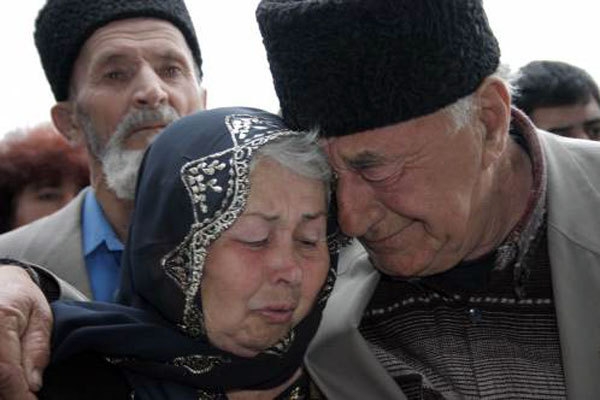While Crimea prepares for March 16th referendum on its autonomy, the Crimean Tatars Muslim community are revising images of Stalin’s 1944 horror and fear of exile after finding their doors marked with an “X”, the sign put by Stalin police before evicting them from their homeland.
“Just as we thought we finally had a future,” Ava, 44, whose mother, Sedeka Memetova, who was eight at the time of deportation from Crimea, told The New Yorker.
“How could anyone do this in the twenty-first century?"
Memetova was one of almost two hundred thousand Crimean Tatar Muslims who were deported on 1944 by Staling outside their homeland in the peninsula.
A few days before eviction, Stalin ordered his police to tag the houses of Crimean Tatars, the native Muslim residents of the peninsula, with an X.
“The soldiers gave us five minutes to pack up,” she said.
“We left everything behind.”
Memetova and her family came back to Crimea almost three decades ago, in 1987.
The images of 1944 were back in the scene seventy years later in 2014 when Memetova’s grandson, Rustem Kadyrov, found an X cut deep into the gray metal of the gate of his house.
Strange scenes started to appear days ago when Ava saw from her window four strange men walking down the street, armed with batons and carrying pieces of paper.
In Chiisty Istochniki Street, where Kadyrov’s home is located, similar marks were engraved on four other houses, all of them residences of Crimean Tatars, according to Kadyrov.
Calling police, Kadyrov said that police members came to see his gate, refusing to register a case.
“The police will not help us,” he said.
“They told me Crimean Tatars are not a priority for them. Of course not—they are punishing us because we do not want Putin here.”
Kadyrov’s Russian neighbors have noticed the markings but dismissed his worries.
“Whoever did it was just joking,” one Russian woman said.
“We get along with our neighbors fine,” she continued. “But it would be helpful if Crimean Tatars stopped supporting Kiev.”
Stick & Carrot
Along with the signs, recent threats from Vladimir Putin, the Russian President, to protect the Crimean peninsula’s Russians from what he called an “orgy of nationalists, and extremists, and anti-Semites” rampaging through the streets of Kiev worried Muslims.
“What does that mean for us?” Kadyrov asked. “Who will protect us?”
As the Russian bear used his stick to threaten intervention in Crimea, his carrot was also shown to Crimean Tatar Muslims to support separation from Kiev.
Many delegates were forwarded to meet with the leaders of the Crimean Tatar community, including the President of Tatarstan, an autonomous Muslim republic in Russia, met with members of the representative body of Crimean Tatars, known as the Mejlis.
“This sudden brotherly love is overwhelming,” Linur Yunusov, a senior journalist at ATR, a Crimean Tatar television channel, said jokingly.
“We are already seeing signs that they are trying to intimidate us, to split us, to stir trouble,” Eskandar Baiibov, a deputy in the Crimean Tatar Mejlis, said.
“Ukrainians are also vulnerable, but at least they have Ukraine to go to. Where will we go? Crimea is our only home.”
In the meantime, many Crimean Tatars remain disappointed that Kiev has not fulfilled its promises to pass laws that would recognize victims of Stalin’s deportation or establish Crimean Tatar-language schools.
More than 300,000 Tatars now live in Crimea, about 15 percent of its population of 2 million people.
“We are on a verge of losing our culture, our language, our identity,” Yunusov, the senior journalist, said.
“For us, a European Ukraine is the only way of making sure that we survive as people,” he said.
“We need European laws to protect our identity. After what happened in 1944, we can never trust the Russians.”
OnIslam



